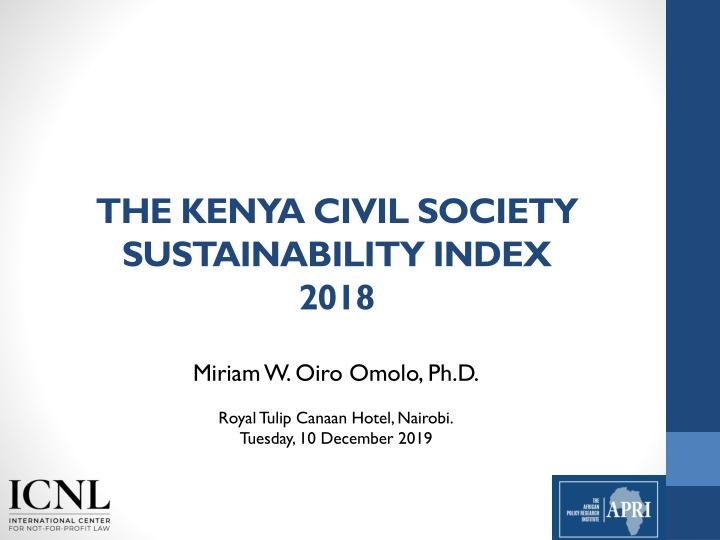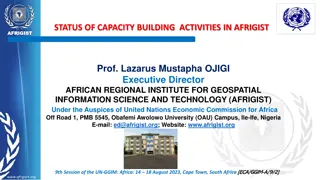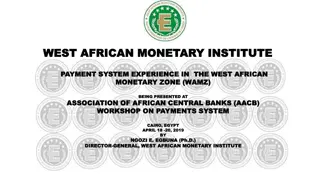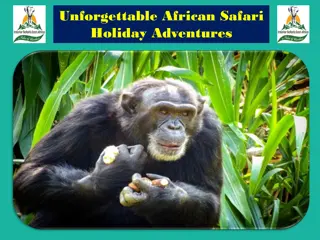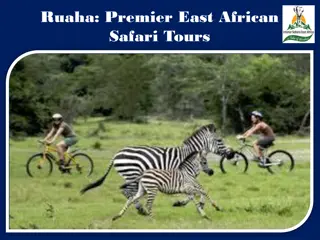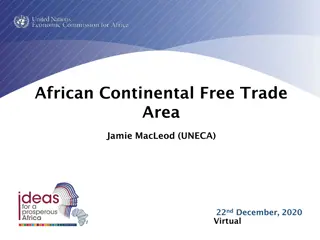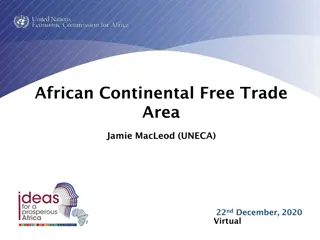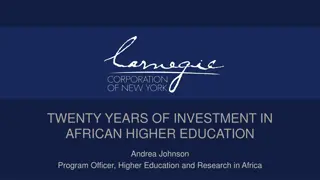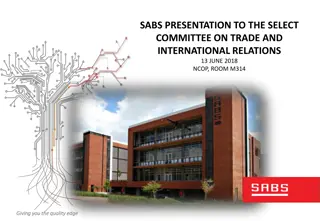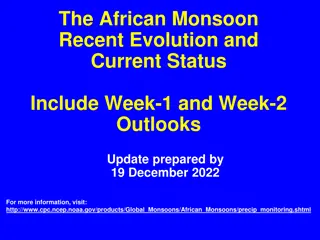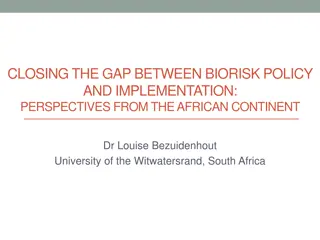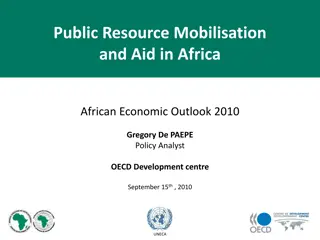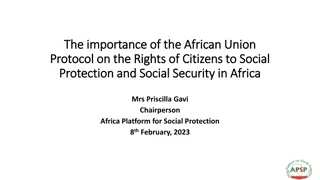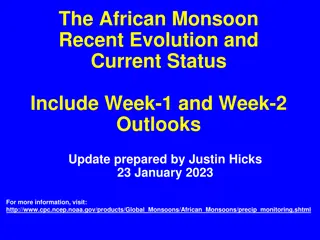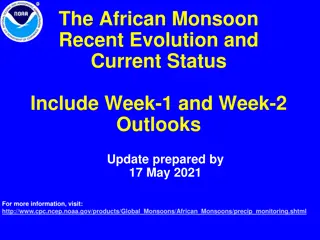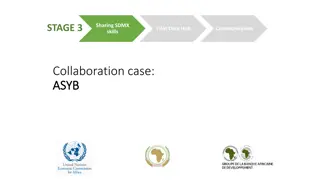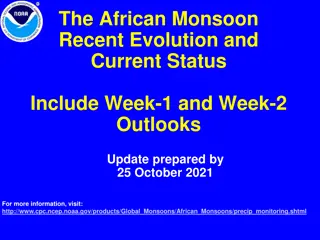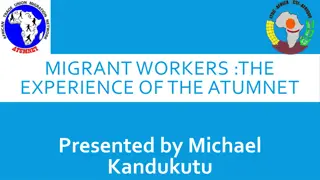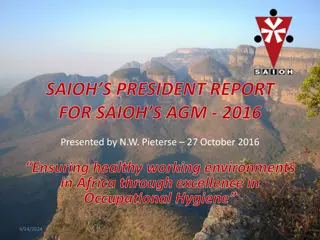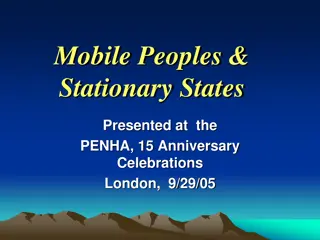African Policy Research Institute - Enhancing Public Policy in Africa
African Policy Research Institute (APRI) is a public policy research think tank focusing on multidimensional development in Africa, aiming to improve policy decisions through rigorous research. APRI collaborates with global organizations to safeguard national interests, inform policy decisions with evidence, and establish research networks. With a vision of a multidimensional approach for Sub-Saharan Africa's challenges, APRI conducts research in trade, governance, environment, and social sectors for effective policy interventions.
Download Presentation

Please find below an Image/Link to download the presentation.
The content on the website is provided AS IS for your information and personal use only. It may not be sold, licensed, or shared on other websites without obtaining consent from the author.If you encounter any issues during the download, it is possible that the publisher has removed the file from their server.
You are allowed to download the files provided on this website for personal or commercial use, subject to the condition that they are used lawfully. All files are the property of their respective owners.
The content on the website is provided AS IS for your information and personal use only. It may not be sold, licensed, or shared on other websites without obtaining consent from the author.
E N D
Presentation Transcript
THE KENYA CIVIL SOCIETY SUSTAINABILITY INDEX 2018 Miriam W. Oiro Omolo, Ph.D. Royal Tulip Canaan Hotel, Nairobi. Tuesday, 10 December 2019
Presentation Outline About the African Policy Research Institute The Civil Society Sustainability Index (CSOSI) Methodology for CSOSI CSOSI Score Kenya 2019
About APRI The African Policy Research Institute (APRI) A public policy research think tank that seeks to improve the quality of public policy decisions by facilitating research and communication, through the adoption of a multidisciplinary approach. This approach is premised on the background that development is multidimensional and consists of intricate interconnected elements in a socio-economic system, which must be considered when providing policy options.
About APRI OBJECTIVES 1. To enhance the analysis of public policy in Africa by conducting rigorous and high quality multi-dimensional research on matters relating to environment, governance and public finance, international trade and investment and other ancillary subjects. 2. To collaborate with international and local organizations of repute, working in Africa and abroad in undertaking public policy research in order to ensure national public interests are safeguarded. 3. To inform policy decisions with research evidence and equally raise the level of awareness on the importance of research in informing public policy. 4. Establish international, regional and national public policy research networks.
About APRI Vision A Sub-Saharan Africa that adopts a multidimensional approach in addressing its challenges for development and poverty reduction. Mission To undertake multidisciplinary public policy research and communication for effective public policy interventions in Sub Saharan African countries Thematic Focus Areas Trade, Investment and Development; Governance and Public Finance; Environment and Climate Change; Social Sector Visit : www.apr-institute.org
The Civil Society Sustainability Index USAID Civil Society Organization Sustainability Index (CSOSI) developed by USAID to assess the strength and overall viability of the CSO sectors. By analyzing seven dimensions that are critical to sectoral sustainability on an annual basis, the Index highlights both strengths and constraints in CSO development. Initially developed in 1997 for Central and Eastern Europe and Eurasia. The CSOSI is a valued tool and methodology used by non- governmental organizations (NGOs), governments, donors, academics and others to better understand the sustainability of the civil society sector. In 2017,The CSOSI was implemented in 71 countries. For the next four years, FHI 360 and the International Center for Not-for-Profit Law (ICNL) are managing the coordination and editing of the CSOSI.
Methodology for CSOSI Select a group of at least 12 experts from different segments of the civil society and converge a meeting where panelists discuss and score various aspects that affect operation of CSOSI The focus areas are: Legal Environment; Organizational Capacity; Financial Viability; Advocacy ; Service Provision; Infrastructure ; Public Image
Methodology for CSOSI The CSOSI uses a seven-point scale, with 1 representing the highest and 7 the lowest level of sustainability. These levels are clustered into three general stages: Sustainability Enhanced (1 to 3) Sustainability Evolving (3.1 to 5) Sustainability Impeded (5.1 to 7).
CSOSI- Subcomponents LEGAL ENVIRONMENT Registration ; Operation; Administrative Impediments and State Harassment; Local Legal Capacity; Taxation; Earned Income. ORGANIZATIONAL CAPACITY Constituency Building; Strategic ; Internal Management Structure; CSO Staffing; Technical Advancement. FINANCIAL VIABILITY Local support; Diversification; Financial Management Systems; Fundraising; Earned income. ADVOCACY Cooperation With Local And Federal Government; Policy Advocacy Initiatives; Lobbying Efforts ; Local Advocacy For Legal Reform
CSOSI- Subcomponents SERVICE PROVISION Range Of Goods and Services ; Community Responsiveness; Constituencies And Clientele; Cost Recovery ; Government Recognition And Support. INFRASTRUCTURE Intermediary Support Organizations (ISOS) And CSO Resource Centers ; Local Grant Making Organizations.; CSO Coalitions ; Training; Inter sectoral Partnerships. PUBLIC IMAGE Media Coverage; Public Perception Of CSOs; Government/Business Perception Of CSOs; Public Relations; Self- regulation.
CSOSI Kenya- 2018 Sustainability Enhancing Sustainability Evolving Sustainability Impeded Public Image 4.3 Infrastructure 3.6 Service Provision 3.4 Advocacy 3.0 Financial Viability 4.8 Organizational Capacity 3.9 Legal Environment 4.5 Overall CSO Sustainability 3.9 0 1 2 3 4 5 6 7
CSOSI Kenya- 2018 vs. 2017 Sustainability Impeded Sustainability Enhancing Sustainability Evolving 4.3 Public Image 4.3 3.7 Infrastructure 3.6 3.5 Service Provision 3.4 3.1 Advocacy 3.0 4.7 Financial Viability 4.8 4.0 Organizational Capacity 3.9 4.4 Legal Environment 4.5 Overall CSO Sustainability 4.0 3.9 0 1 2 3 4 5 6 7
What Happened in 2018? Overall Sustainability Relative tranquility returned to Kenya in 2018 after the hotly contested elections of 2017- The Handshake. Kenya was rocked by five major corruption cases involving senior public officials in 2018. NYS, NCPD, Youth Enterprise Development Fund , National Tree-Planting Program, KPC Legal Environment The legal environment deteriorated slightly in 2018 as state harassment of CSOs continued after the general elections of late 2017. The transfer in 2017 of the NGO Coordination Board from the Ministry of Devolution and Planning to the Ministry of Interior and Coordination of National Government as a sign that the government regards them as security risks rather than development partners. A new Associations Bill tabled in 2018 provides a framework for the registration and governance of associations of CSOs. Still at AG.
What Happened in 2018? Organizational Capacity CSOs organization capacity improved slightly in 2018 as they worked more intensively with constituencies, including governments, at the national and sub-national levels, particularly to develop mechanisms for monitoring service delivery. Many CSOs have strategic plans with well-crafted vision and mission statements, but their implementation is subject to funding. Established CSOs operating at the national level usually have written policies on procurement, finance, and human resource management, as well as operational and procedural manuals. Most CSOs rely on project funding, which can make it difficult for them to maintain permanent staff.
What Happened in 2018? Financial Viability CSO financial viability was slightly weaker in 2018, because of continuing declines in donor funding and increasing focus on accountability and post- election issues decreased the funding available for activities in sectors such as health care and education. CSOs receive the bulk of their funding from bilateral donors DFID, Danish International Development Agency, and Swedish International Development Cooperation Agency. Most donor support has shifted to the county level, where it largely targets CSOs working on open governance, devolution, and accountability. Very few funders are willing to engage in long-term partnerships with CSOs, which leaves organizations reliant on short-term projects that demand a lot of deliverables, such as harvested data and reports on results. Funding for research, which tends to require longer timeframes, is difficult to find since donors are focused on quick results. Many CSOs have multiple sources of support, particularly if they rely on project-based funding. Ensuring the sustainability of funding has been a challenge since Kenya was elevated to a middle-income country in 2014.
What Happened in 2018? Advocacy CSO advocacy improved slightly in 2018 as donors interest in accountability and post-election issues encouraged more activity in those areas. At the sub-national level, CSOs focused on social issues, such as education and health care, worked with local governments to improve service delivery through awareness raising and capacity building. However, in some counties, government officials poorly understood CSO efforts to engage in civic education which contributed to cold war or slowdown in cooperation between the two sides. Public participation was hampered when notices for meetings were shared only a week in advance, leading to complaints that the public was meant merely to rubber-stamp predetermined outcomes.
What Happened in 2018? Service Provision CSOs were able to ensure that the provision of services in these sectors continued even as their resources declined. Many CSOs work with communities to develop social accountability mechanisms such as community scorecards, which inform local governments of issues needing their attention. CSOs seek to share informational and educational materials and research publications with their constituencies. Some organizations work closely with
What Happened in 2018? Sectoral Infrastructure CSOs benefitted from new or expanded resource centers, training opportunities, and productive intersectoral partnerships. Local grant makers include the Uraia Trust, which tracks grantee performance through monthly and quarterly reports, and the Yetu Initiative of the Aga Khan Foundation (AKF), which hosts periodic forums in which grantees share information on progress, challenges, and lessons learned during their projects. CSO coalitions have declined because of inadequate funding and competition among organizations. Coalition members have become less open with each other, leading to poor coordination and the duplication of efforts.
What Happened in 2018? Public Image Media coverage of CSOs was generally positive. Both national and county- level media continued to invite CSO experts to discuss issues of public interest. For example, staff from GRADIF appeared on live radio talk shows and local stations, including Wimwaro FM and Inooro FM, to discuss child rights, public participation in devolved governance, and development projects. Coverage of CSO activities in development was minimal, as they tend not to be sensational. Following the disputed 2017 elections, the public was more aware of CSOs such as KHRC, Info Action, and AfriCOG, because of their work on promoting electoral justice. Some government officials view CSOs working on civic education and health as threats, since they raise questions and educate citizens about their rights. CSOs increasingly appreciate the need to use internet-based platforms as marketing tools. More than half of Uraia Trust grantees are active on social media, and some have websites.
THE END & THANK YOU
